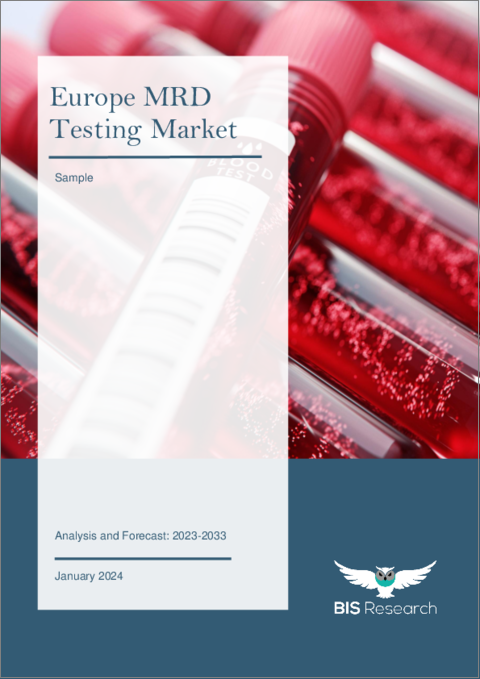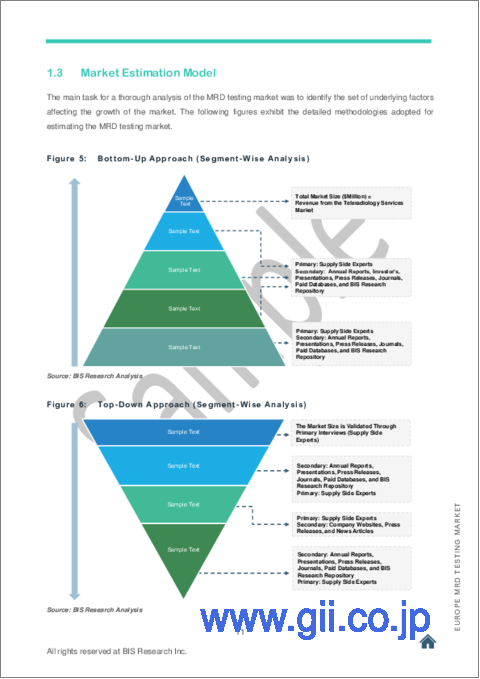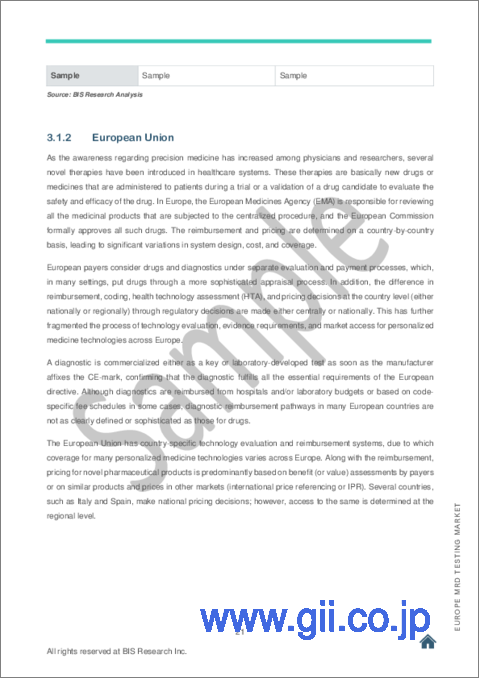|
|
市場調査レポート
商品コード
1419005
欧州のMRD(微小残存病変)検査市場 - 分析と予測(2023年~2033年)Europe MRD Testing Market: Analysis and Forecast, 2023-2033 |
||||||
カスタマイズ可能
|
|||||||
| 欧州のMRD(微小残存病変)検査市場 - 分析と予測(2023年~2033年) |
|
出版日: 2024年01月31日
発行: BIS Research
ページ情報: 英文 66 Pages
納期: 1~5営業日
|
全表示
- 概要
- 図表
- 目次
欧州のMRD(微小残存病変)検査の市場規模は、2023年の4億2,000万米ドルから2033年には17億4,000万米ドルに達し、予測期間の2023年~2033年のCAGRは15.19%になると予測されています。
MRD検査市場は、MRD検査に対する医療保険の適用拡大や固形腫瘍の診断における活用など、さまざまな要因によって成長を遂げています。消費者の意識の高まりとともに、MRD検査に対する需要が最近高まっています。ヘルスケア専門家や調査はこの変化を認識し、患者の要望に応えるためにMRD検査を臨床手順に組み込むことに取り組んでいます。
| 主要市場統計 | |
|---|---|
| 予測期間 | 2023年~2033年 |
| 2023年の評価額 | 4億2,000万米ドル |
| 2033年予測 | 17億4,000万米ドル |
| CAGR | 15.19% |
欧州のMRD検査市場は、ポリメラーゼ連鎖反応(PCR)、次世代シーケンシング(NGS)、フローサイトメトリーなどの先進技術の採用により、著しい成長を遂げています。このアプローチは、治療後の残存がん細胞の検出と定量化において極めて重要な役割を果たしています。MRD検査は、医療提供者が治療反応を注意深くモニターし、再発のリスクを評価し、個別化された治療戦略を調整することを可能にし、臨床試験において重要なエンドポイントとして機能するため、欧州では臨床的重要性を有しています。微小残存病変を特定し、それに対処するためのこの積極的なアプローチは、欧州のヘルスケア環境全体において、医療従事者が治療成績の改善と患者の生存率の向上を目指すための力となります。MRD検査の重要性が認識されつつあることで、同地域全体で同市場の継続的な拡大が見込まれています。
当レポートでは、欧州のMRD検査市場について調査し、市場の概要とともに、エンドユーザー別、地域別の動向、および市場に参入する企業のプロファイルなどを提供しています。
目次
エグゼクティブサマリー
第1章 市場
- 市場範囲
- 調査手法
- 市場推定モデル
第2章 市場概要
- MRD検査のワークフロー分析
- MRD検査:固形腫瘍vs血液悪性腫瘍
- MRD検査の進化
- 市場の概要
- 市場規模と今後の成長可能性
第3章 業界考察
- MRD検査の法的および規制の枠組み
- 欧州
- 欧州連合
- サプライチェーン分析
- ラボ開発テスト(LDT)
- 体外診断(IVD)
第4章 MRD検査市場(地域別)、2022年~2033年
- 概要
- 欧州
- 欧州のMRD検査市場、エンドユーザー別
- 欧州のMRD検査市場、国別
第5章 企業プロファイル
- MRD Testing Ecosystem Active Players
- Cergentis B.V.
- F. Hoffmann-La Roche Ltd.
- ICON plc
List of Figures
- Figure 1: Europe MRD Testing Market, $Billion, 2022 and 2033
- Figure 2: Share of Europe MRD Testing Market (by End User), $Billion, 2022 and 2033
- Figure 3: Share of MRD Testing Market (by Region), 2022
- Figure 4: MRD Testing Market: Research Methodology
- Figure 5: Primary Research Methodology
- Figure 6: Bottom-Up Approach (Segment-Wise Analysis)
- Figure 7: Top-Down Approach (Segment-Wise Analysis)
- Figure 8: MRD Testing Workflow
- Figure 9: Evolution of the MRD Testing Market
- Figure 10: Europe MRD Testing Market Potential, $Billion, 2022-2033
- Figure 11: Laboratory Methods for MRD Detection
- Figure 12: Supply Chain Analysis of Laboratory-Developed Tests
- Figure 13: Supply Chain Analysis of In-Vitro Diagnostics
- Figure 14: MRD Testing Market Snapshot (by Region)
- Figure 15: Europe MRD Testing Market, $Billion, 2022-2033
- Figure 16: Europe: Market Dynamics
- Figure 17: Europe MRD Testing Market (by End User), $Million, 2022-2033
- Figure 18: Europe MRD Testing Market (by Country), $Million, 2022-2033
- Figure 19: Germany MRD Testing Market, $Million, 2022-2033
- Figure 20: France MRD Testing Market, $Million, 2022-2033
- Figure 21: U.K. MRD Testing Market, $Million, 2022-2033
- Figure 22: Italy MRD Testing Market, $Million, 2022-2033
- Figure 23: Spain MRD Testing Market, $Million, 2022-2033
- Figure 24: Rest-of-Europe MRD Testing Market, $Million, 2022-2033
- Figure 25: MRD Testing Market, Total Number of Companies Profiled
- Figure 26: Cergentis B.V.: Product Portfolio
- Figure 27: F. Hoffmann-La Roche Ltd: Product Portfolio
- Figure 28: F. Hoffmann-La Roche Ltd: Overall Financials, 2020-2022
- Figure 29: F. Hoffmann-La Roche Ltd: Revenue (by Segment), 2020-2022
- Figure 30: F. Hoffmann-La Roche Ltd: R&D Expenditure, 2020-2022
- Figure 31: ICON plc: Product Portfolio
- Figure 32: ICON plc: Overall Financials, $Million, 2019-2021
- Figure 33: ICON plc: Revenue (by Region), $Million, 2019-2021
List of Tables
- Table 1: Impact Analysis of Market Drivers, Challenges, and Opportunities in the Europe MRD Testing Market
- Table 2: Comparison of Solid Tumor and Hematological Malignancy for MRD Testing
- Table 3: Comparison of FDA and EMA Draft Guidance
“The Europe MRD Testing Market Expected to Reach $1.74 Billion by 2033.”
Introduction to Europe MRD Testing Market
The Europe MRD testing market is projected to reach $1.74 billion by 2033 from $0.42 billion in 2023, growing at a CAGR of 15.19% during the forecast period 2023-2033. The MRD testing market is experiencing growth due to various factors, such as the extension of medicare coverage for MRD testing and its utilization in diagnosing solid tumors. With the rise in consumer awareness, there is a growing demand for MRD testing in recent times. Healthcare professionals and researchers are acknowledging this shift and working towards incorporating MRD testing into clinical procedures to meet patient demands.
| KEY MARKET STATISTICS | |
|---|---|
| Forecast Period | 2023 - 2033 |
| 2023 Evaluation | $0.42 Billion |
| 2033 Forecast | $1.74 Billion |
| CAGR | 15.19% |
Market Introduction
The MRD testing market in Europe is witnessing significant growth, driven by the adoption of advanced techniques like polymerase chain reaction (PCR), next-generation sequencing (NGS), and flow cytometry. This approach plays a pivotal role in the detection and quantification of residual cancer cells post-treatment. MRD testing holds clinical importance in Europe as it enables healthcare providers to closely monitor treatment response, assess the risk of relapse, tailor personalized therapeutic strategies, and serves as a crucial endpoint in clinical trials. This proactive approach to identifying and addressing minimal residual disease empowers healthcare professionals to aim for improved treatment outcomes and enhanced patient survival rates across the European healthcare landscape. The growing recognition of MRD testing's significance is expected to drive continued expansion in this market throughout the region.
Market Segmentation:
Segmentation 1: by End User
- Hospitals and Speciality Clinics
- Research Institutions
- Diagnostic Laboratories
- Other End Users
Segmentation 2: by Region
- Germany
- France
- U.K.
- Italy
- Spain
- Rest-of-Europe
How Can This Report Add Value to an Organization?
Growth/Marketing Strategy: The Europe MRD testing market has seen major development by key players operating in the market, such as business expansion, partnership, collaboration, and joint venture. The favored strategy for the companies has been partnerships and collaborations to strengthen their position in the MRD testing market.
Competitive Strategy: Key players in the Europe MRD testing market analyzed and profiled in the study involve major residual testing-based companies and test manufacturers. Moreover, a detailed competitive benchmarking of the players operating in the Europe MRD testing market has been done to help the reader understand how players stack against each other, presenting a clear market landscape. Additionally, comprehensive competitive strategies such as partnerships, agreements, and collaborations will aid the reader in understanding the untapped revenue pockets in the market.
Key Market Players and Competition Synopsis
The companies that are profiled have been selected based on inputs gathered from primary experts and analyzing company coverage, product portfolio, and market penetration.
Some prominent names established in this market are:
|
|
Table of Contents
Executive Summary
1. Markets
- 1.1. Market Scope
- 1.1.1. Key Questions Answered in the Report
- 1.2. Research Methodology
- 1.2.1. MRD Testing Market: Research Methodology
- 1.2.2. Data Sources
- 1.3. Market Estimation Model
- 1.3.1. Criteria for Company Profiling
2. Market Overview
- 2.1. MRD Testing Workflow Analysis
- 2.2. MRD Testing: Solid Tumor vs. Hematological Malignancy
- 2.3. Evolution of MRD Testing
- 2.4. Market Footprint
- 2.5. Market Size and Future Growth Potential
3. Industry Insights
- 3.1. Legal and Regulatory Framework of MRD Tests
- 3.1.1. Europe
- 3.1.2. European Union
- 3.2. Supply Chain Analysis
- 3.2.1. For Laboratory Developed Tests (LDTs)
- 3.2.2. For In-Vitro Diagnostics (IVDs)
4. Minimal Residual Disease Testing Market (by Region), 2022-2033
- 4.1. Overview
- 4.2. Europe
- 4.2.1. Europe MRD Testing Market, by End User
- 4.2.2. Europe MRD Testing Market, by Country
5. Company Profiles
- 5.1. Overview
- 5.2. MRD Testing Ecosystem Active Players
- 5.3. Cergentis B.V.
- 5.3.1. Company Overview
- 5.3.2. Role of Cergentis B.V. in the MRD Testing Market
- 5.3.3. Analyst Perspective
- 5.4. F. Hoffmann-La Roche Ltd.
- 5.4.1. Company Overview
- 5.4.2. Role of F. Hoffmann-La Roche Ltd in the MRD Testing Market
- 5.4.3. Financials
- 5.4.1. Recent Developments
- 5.4.2. Analyst Perspective
- 5.5. ICON plc
- 5.5.1. Company Overview
- 5.5.2. Role of ICON plc in the MRD Testing Market
- 5.5.3. Financials
- 5.5.4. Analyst Perspective





